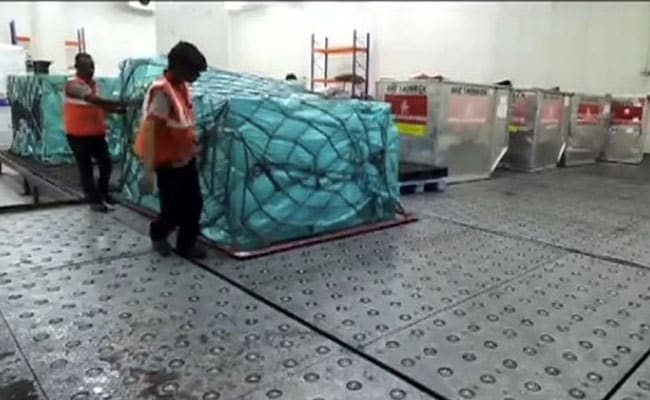
The existing cold chain facilities in India are capable of storing the first shipment of nearly three crore novel coronavirus vaccines that have been earmarked for frontline healthcare and medical workers, the Health Ministry said Tuesday evening. The government had earlier also indicated that old people suffering from serious medical conditions, will be given priority too.
Delhi and Hyderabad airports have already begun prepping temperature-controlled containers and zones to store millions of doses expected to be made available over the next few weeks and months.
Both airports, which already have advanced pharma and vaccine storage and processing zones, also have special "cool chambers" in which temperature can be set as low as -20 degrees Celsius and "cool dollies", or special trolleys that ensure vaccines are protected (and optimum temperatures maintained) during movement of cargo between the aircraft and cargo terminal.
In addition, both airports, which operated as major hubs in the early days of the pandemic and transported millions of PPE kits, medical supplies and perishable goods, have also taken steps to minimise human contact with the chain of transportation and storage of the vaccine doses.
#WATCH | GMR Hyderabad air cargo and Delhi Airport's air cargo are set to play a pivotal role in the distribution of vaccines through state-of-the-art time-and temperature-sensitive distribution system. (Video source - GMR) pic.twitter.com/5yizh3Vb0F
— ANI (@ANI) December 5, 2020
An expert panel will meet Wednesday to review requests by the Serum Institute of India, pharma giant Pfizer and Bharat Biotech to approve emergency use of their Covid vaccines in India; this will allow the vaccine to be administered for a limited period of time or on specific groups of people.
The Serum Institute vaccine was developed by AstraZeneca and Oxford University. Interim clinical trial data from the UK and Brazil shows it is up to 90 per cent effective.
The vaccine by Pfizer and German biotechnology partner BioNTech has reported efficiency of 95 per cent in Phase III trials. The vaccine has been rolled out in the United Kingdom.
The third vaccine is Covaxin, which is developed by Bharat Biotech, a Hyderabad-based pharma firm. It is currently in Phase III trials and has yet to release efficacy data.
The AstraZeneca vaccine, labelled Covishield, has an advantage that could be significant for India and other developing nations - it can be stored at fridge temperatures. The Pfizer vaccine, on the other hand, needs to be kept at -70 degrees Celsius.
The vaccine can, however, be stored in hospital refrigeration units in for up to five days.
Pfizer has also advised use of ultra-low-temperature freezers (commercially available) that can extend vaccine shelf life by six months. The pharma giant also said the "specially designed, temperature-controlled thermal shippers" in which the doses will arrive could be used as "temporary storage units.

Cold storage chambers in Delhi, Hyderabad airports being readied for Covid vaccines
On Friday Prime Minister Narendra Modi said a nation-wide vaccination drive would begin once experts signed off on the Covid vaccine candidates. Addressing an all-party meeting to discuss logistics, the Prime Minister said: "Experts expect the vaccine will be ready in the next few weeks."
India has reported over 97 lakh Covid cases since the pandemic began in December last year. Of these around 3.83 lakh are active cases and 1.41 lakh are deaths linked to the virus.
With input from ANI, PTI
Track Latest News Live on NDTV.com and get news updates from India and around the world

